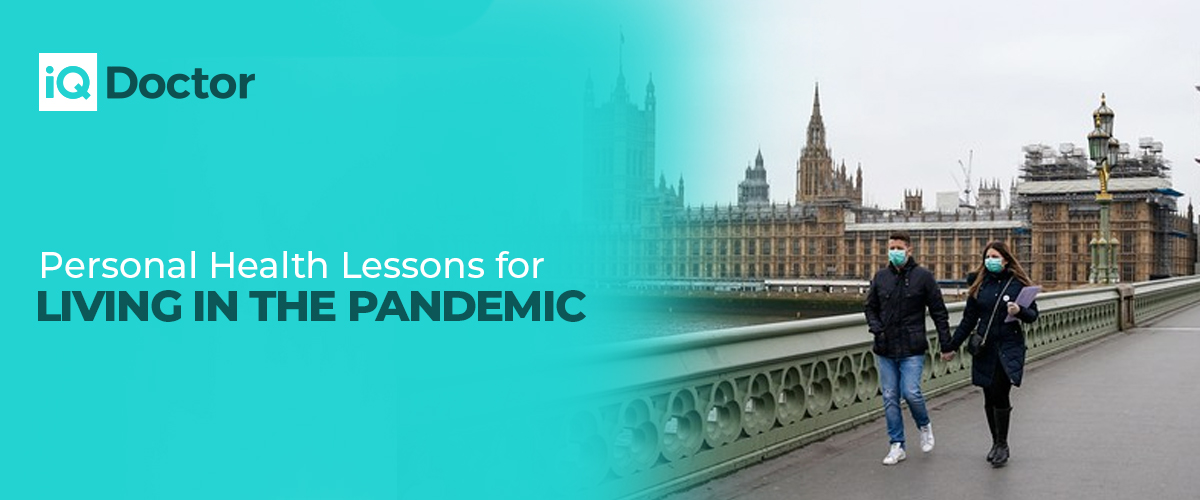Personal Health Lessons for Living in the Pandemic
28 April, 2021 | Jane Thomas - Marketing

Where did the Coronavirus Come From?
Most scientists say that the novel coronavirus came from nature. With much of the world gripped by COVID-19, the story of how the virus originated remained a mystery. These gaps in knowledge about the virus’s precise origin led to conspiracy theories. The conspiratorial belief that COVID-19 is a human-made virus, that it kills your soul, steals your DNA, and is a hoax, became widespread, and all this time, COVID-19 kept spreading like wildfire. Simultaneously, several groups emerged around the world saying no to masks and social distancing, and social media platforms like Facebook, Twitter And Instagram became the primary medium for it all. Our momentary ignorance of the virus was hurting our efforts to contain it in many ways.
Based on the current analysis of the virus, scientists say that the similarity of its genetic material is closest to that of a bat. It is believed that a bat infected another animal, which infected a human. This type of virus spreads from one species to another, known as a zoonotic virus. Previously occurring SARS and MERS viruses are also examples of viruses that spread from one species to another. Some such viruses are mild, while others spread quickly and potentially cause many deaths. When a new virus emerges, humans have no immunity against it, and that’s why it is important to understand where the virus came from to address it adequately.
The COVID-19 virus is a pointy protein shaped like a crown, that adheres to the body’s cells infecting it. This protein type has never been seen before, which suggests that this virus came from nature and not a lab. The COVID-19 outbreak was first witnessed in the Chinese city of Wuhan, and according to the World Health Organization, the origin of the COVID-19 virus was the Huanan Seafood Wholesale Market.
The Times Before and COVID-19
It’s been over a year since the COVID-19 virus first emerged. Since then, it has taken a toll on 219 countries and territories worldwide. Before the world got confined indoors, thousands of people walked the streets, went out to restaurants and parks, vacationed to the top tourist attractions worldwide, without any concern about contracting a potentially deadly disease. No one thought twice before shaking hands or hugging their loved ones, but now we live in a new normal, where social distancing and quarantines are common. The life we once knew now seems like a distant memory. Recalling all those memories makes us realise how we took it all for granted. We used to go about our daily lives not knowing that every other person in the world has a life just like us, vivid and complex. Now, our life troubles seem pretty insignificant in the greater scheme of things. We used to think that we are separate from others, but this crisis has shown us in an excruciating way that we are all in this together. On the one hand, while COVID-19 has changed the way we once lived, it has also taught us new ways to maintain a healthy and active lifestyle.
COVID-19 Vaccines: A Ray of Hope
With COVID -19 affecting over 128,950,780 people, the only ray of hope the world saw was getting the COVID-19 Vaccine. The most powerful tool that will mark the end of this pandemic starts with the development of the COVID-19 Vaccines.
Types of COVID-19 Vaccines
Developing a vaccine takes years of work, but it has been necessary to hasten it up with this pandemic. Three COVID-19 Vaccines have been approved by the Medicines and Healthcare products Regulatory Agency (MHRA) in the UK. These COVID-19 Vaccines have been developed rapidly, driven by billions of dollars of investment under a coordinated global effort.
This has also been helped by new vaccine technology that was being worked on for decades.
The three approved COVID-19 Vaccines include Pfizer/BioNTech, Oxford/AstraZeneca and Moderna. The NHS is currently offering vaccines to people most at risk from COVID-19, which provides for people over the age of 50, clinically vulnerable people, care home workers, people who have a learning disability, or happen to be the primary caretaker of someone at a high risk of getting infected.
The vaccine is given in two doses and is injected into the upper arm. The second dose is administered 3 to 12 weeks after getting the first dose.
How do COVID-19 Vaccines Work?
After we’ve been exposed to an infection, our immune system remembers the threat by producing antibodies. These antibodies circulate in the blood throughout the body and quickly recognise and disable the invading virus upon contact, preventing or minimising the illness. As long as we have antibodies in our system, we are immune. This is why we usually do not get sick with the same virus twice.
Vaccines mimic this process, encouraging the immune system to make antibodies without suffering the illness. Some of the leading COVID-19 Vaccine candidates are mRNA vaccines. These Vaccines are based on incorporating the genetic blueprint of the key pointy protein on the virus surface. When this formula is injected into humans, it instructs our cells to produce the pointy proteins. The body then makes antibodies against the protein, thus inhibiting the virus’s severity in the future.
This strategy is faster than some of the more traditional approaches, which often generate weakened or inactive forms of a live virus or make large amounts of pointy proteins to determine whether they can prompt an antibody response.
Once a potential vaccine is discovered, several checkpoints must be passed through before it can be made accessible in the market. Number one is Pre-Clinical Tests, which involve experiments in a lab on animals, by which scientists ensure that the vaccine is effective and safe. The next step is Clinical Trials. When the vaccine passes the Pre-Clinical Trials, it is then tested on a small group of people. The number of people in a group is increased eventually, with scientists and doctors closely monitoring the people under the trial.
Upon completing the clinical trials successfully, the next step is getting approval for the vaccine to be administered to the public. Once the vaccine gets approved by the regulatory agencies, the vaccines are sent for large scale manufacturing and distribution, and the licensed vaccines are administered widely.
Public and Personal Health Lessons from COVID-19
Whether we were affected by COVID-19 or not, our simple daily life activities have been affected in many ways. A typical pre-pandemic day might have several activities such as grocery shopping, school or work, physical activities, gatherings with friends and family etc. The way we went about these activities has significantly changed over the past year with extensive use of disinfectants and sanitisers, avoiding closed spaces and wearing masks. Staying confined to the house all day can severely impact health. While you wait to get the COVID-19 Vaccine, the following are some things you can incorporate into your daily schedule for a healthier lifestyle:
Staying Safe During the Pandemic
It is essential to follow the safety measures and take certain precautions until you get the COVID-19 Vaccine. You should stay safe afterwards as well.
Covering your nose and mouth when coughing is essential, as it helps stop the spread of germs to the people around you, and the same applies to wearing masks. It’s essential to wash hands regularly with an alcohol-based face rub or soap and sanitise your hands if there is no water available around you.
It is also crucial to maintain at least a 1-meter distance in public places or around a group of friends. Washing hands, keeping distance and working out weekly are essential steps to follow during this pandemic. Eating healthy foods and taking health supplements is also necessary to boost your immune system.
Is it Safe to Get the COVID-19 Vaccine?
There has been a lot of pressure on researchers to develop a quick and effective solution to stop the current COVID-19 Pandemic. There are genuine concerns of safety for the hastened timeline of the COVID-19 Vaccine’s development.
All the COVID-19 Vaccines have been approved for use and have met strict safety standards, quality and effectiveness. According to the National Health Service UK, vaccines will only be available on the NHS once tested thoroughly.
So far, millions of people have been given a COVID-19 vaccine, and reports of severe side effects, such as allergic reactions, have been scarce. No long-term complications have been reported.
PCR Tests after COVID-19 Vaccination
If you are unsure about whether or not the COVID-19 Vaccination has been effective, you can get an antibody test done to see whether or not you have developed antibodies. Getting an Antibody Test is not at all complicated and is relatively fast and straightforward.
iQ Doctor is a fully legal, registered British online pharmacy which offers Antibody Testing Kits online. You can administer the test at home by following the packaging’s instructions. Travelling using the Antibody Test Kit is now easier than ever.
Benefits of Getting the COVID-19 Vaccine
The most significant benefit of getting the COVID-19 Vaccine is protection against the COVID-19 virus. Both Pfizer and Moderna demonstrate 95 % efficacy in preventing COVID-19 in adults.
Vaccines keep you and the people around you safe by boosting antibodies and building immunity in your body. It makes sure that vulnerable people in your community are safe.
It enables safe travel, and in the future, international travel may likely require vaccine certificates.
It permits you to have larger social gatherings, and eventually, as more people get vaccinated and the herd immunity grows, the infection rate falls as well.
Getting Vaccinated is a personal choice, but it is crucial to curb the spread of this deadly virus. COVID-19 has changed the way we live, it has evolved our health and hygiene habits. For better or worse the only hope we have to put an end to this pandemic is through COVID-19 vaccines.
Reviewed By

Omar El-Gohary
The superintendent and lead pharmacist - registration number 2059792.
Omar is passionate about developing healthcare technology to empower our patients.
Related Posts
Tags
No Tags Available


